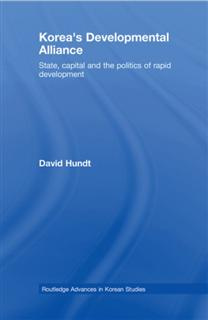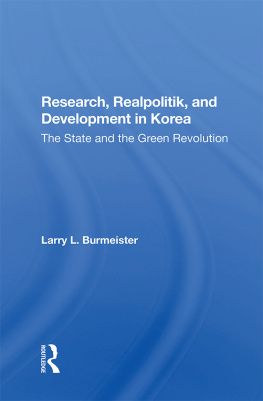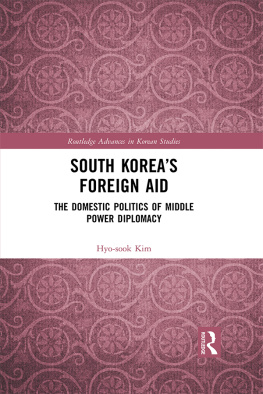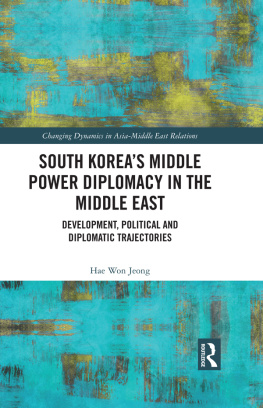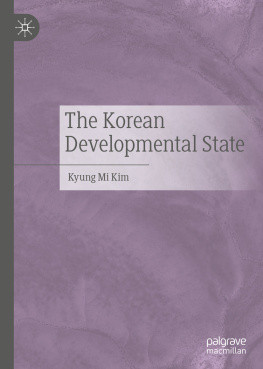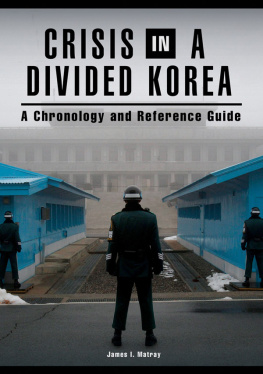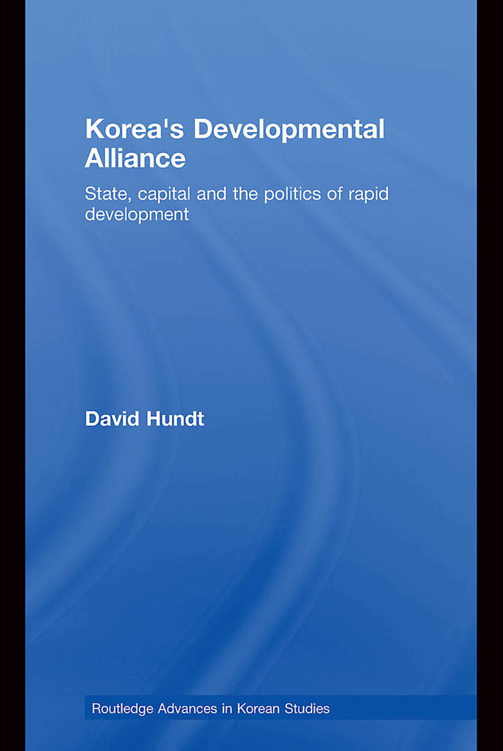Koreas Developmental Alliance
South Korea is often cited as a case of miraculous transformation from poverty to prosperity. Koreas achievement of moving from one of the worlds poorest countries as recently as the early 1960s to the ranks of the ten biggest economies only four decades later has rightly attracted interest from policymakers and scholars alike.
This book identifies the factors that shaped relations between the state and big business in Korea, the developmental alliance. These factors offer a cogent framework in which to identify and predict changes in power relations between government and business. Rather than merely offering a means of explaining the rapid-growth phase of Korean development, the politics of the developmental alliance also help us understand how and why the Korean miracle turned to crisis in 1997 and why the subsequent recovery has been so uneven. In this way, the book highlights the political power of business, which is often underplayed in discussions of the development of Korea. It also sheds light on the constraints on policymakers during modernisation, and how power is shared among a small number of powerful parties.
Illustrating the tumultuous politics of the developmental alliance between business and government during the rise and decline of South Koreas economic miracle, this book is an essential read for anyone interested in Korean politics, economics and development.
David Hundt is Lecturer in International Relations at Deakin University, Australia.
Routledge Advances in Korean Studies
1 The Politics of Economic Reform in South Korea
A fragile miracle Tat Yan Kong
2 Market and Society in Korea
Interest, institution and the textile industry Dennis McNamara
3 Social and Economic Policies in Korea
Ideas, networks and linkages Dong-Myeon Shin
4 North Korea in the World Economy
Edited by E. Kwan Choi,
Yesook Merrill and E. Han Kim
5 Legal Reform in Korea
Edited by Tom Ginsburg
6 Women, Television and Everyday Life
Journeys of hope Youna Kim
7 Transformations in Twentieth Century Korea
Edited by Chang Yun-Shik and Steven Hugh Lee
8 The Development of Modern South Korea
State formation, capitalist development and national identity Kyong Ju Kim
9 Industrial Relations in Korea
Diversity and dynamism of Korean enterprise unions from a comparative perspective
Jooyeon Jeong
10 The Global Korean Motor Industry
The Hyundai motor companys global strategy
Russell D. Lansbury, Chung-Sok Suh and Seung-Ho Kwon
11 Korean Workers and Neoliberal Globalisation
Kevin Gray
12 Korea in the New Asia
East Asian integration and the China factor Francoise Nicolas
13 Foreign Direct Investment in Post-Crisis Korea
European investors and mismatched globalization
Judith Cherry
14 Korea Confronts Globalization
Edited by Chang Yun-Shik, Hyun-ho Seok and Donald L. Baker
15 Koreas Developmental Alliance
State, capital and the politics of rapid development David Hundt
Koreas Developmental Alliance
State, capital and the politics of rapid development
David Hundt
R
Routledge
Taylor & Francis Group LONDON AND NEW YORK
First published 2009 by Routledge
2 Park Square, Milton Park, Abingdon, Oxon OX14 5RN
Simultaneously published in the USA and Canada by Routledge
29 West 35 th Street, New York, NY 10001
This edition published in the Taylor & Francis e-Library, 2008.
To purchase your own copy of this or any of Taylor & Francis or Routledges collection of thousands of eBooks please go to www.eBookstore.tandf.co.uk.
Routledge is an imprint of the Taylor & Francis Group, an informa business
2009 David Hundt
All rights reserved. No part of this book may be reprinted or reproduced or utilised in any form or by any electronic, mechanical, or other means, now known or hereafter invented, including photocopying and recording, or in any information storage or retrieval system, without permission in writing from the publishers.
British Library Cataloguing in Publication Data A catalogue record for this book is available from the British Library
Library of Congress Cataloging in Publication Data Hundt, David.
Koreas developmental alliance: state, capital and politics of rapid development/David Hundt. p.cm.
Includes bibliographical references and index.
1. Business and politicsKorea (South). 2. Korea (South) Economic policy. 3. Economic developmentKorea (South).
4. Korea (South)Economic conditions. 5. Korea (South) Politics and government. I. Title.
HC467.756.H86 2008
338.95195dc22 2008017316
ISBN 0-203-88906-1 Master e-book ISBN
ISBN10: 0-415-46668-7 (hbk)
ISBN10: 0-203-88906-1 (ebk)
ISBN13: 978-0-415-46668-4 (hbk) ISBN13: 978-0-203-88906-0 (ebk)
Overview of the book
The framework described in this chapter has the potential to provide a theoretical basis to Korean political economy. As noted above, one of the great unanswered questions is whether the Korean experience and model
Table 1.1 Framework for analysis
Bureaucracy
How have ideas and orientations changed over time?
How well insulated has the pilot agency been from external penetration
(and political interference)?
Has the quality of the bureaucracy changed?
Social pressures
How has democratisation affected the DA and the policy agenda?
How important is it for the DA to be seen as legitimate in the eyes of civil
society?
To what degree have anti-capitalist measures been incorporated in the policy agenda?
National security
How has the passing of the Cold War influenced the DA?
What changes have ensued from the relative decline in American economic
power?
How has the US worldview changed since the war on terror, and how does this affect Koreas developmental trajectory?
Economic conditions
What is the relationship between economic performance and business power?
How do sudden economic declines and crises impact on the DA?
How is both blame and kudos for economic performance apportioned? Who
decides when and how this occurs?
Globalisation
How has globalisation affected Koreas institutions, economic policies and business practices?
How has globalisation influenced the capacity of the Korean state to direct the course of economic development?
How has increasing competition impacted on the Korean political economy?
are unique products of the ROKs time and place in world history or whether they serve as a replicable model for other developing countries. How are we to assess the legacy of the DA? Prior to embarking on our analysis of the developmental alliance, it is worth reviewing the field of research into Korean political economy. For this reason Chapter 1 introduces the main approaches to the Korean state in the post-war era - neoclassical economics and the statist-institutionalist perspective - and explores the evolution of each framework and their main conceptual features. Given that both approaches are insufficient for analysing the DA, the book draws on the business power literature in order to formulate a historically focused, comprehensive explanatory framework. The framework is presented in Chapter 2, which examines state-business relations by considering the five contextual variables outlined briefly in the previous section.
Chapter 3 focuses on the patterns of political economy during the pretake-off stage of Korean development. Park Chung Hee and his fellow coup-makers were first-hand witnesses to a nationalist state-led development model during the Japanese colonial era. This demonstration effect was twofold: the colonial era showcased the supposed virtues of state-led development and also the perils of relying on despotic power. In a similar manner, Rhees government was not developmental; it instead relied on the ROKs close security ties with the US to focus on economic reconstruction via American aid projects, import substitution and land reform (Kong 2000: 24). Even though the DA did not come into being until the Park era, we focus on the gradual emergence of two crucial conditions for the developmental alliance - national security concerns and the rationale for a developmental state due to immature economic conditions - in the pre-take-off phase.

